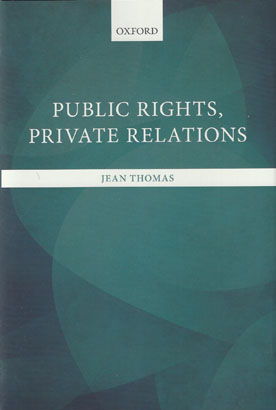
The abuse of workers in export processing zones in developing countries, the undignified treatment of elderly people in care homes, and the dangers for internet users' privacy arising from private companies' control of their data are prominent examples of how our most fundamental interests are increasingly jeopardized by powerful private actors.
Jean Thomas argues that, while these interests are protected by human and constitutional rights in relation to the state, no similar protections exist in relations among private actors. To address this problem, she develops a theoretical framework for the application of human and constitutional rights among private actors.
The author proposes a theory of private liability for public rights violations that allows us to answer the question: who should bear the duties associated with human and constitutional rights in the private sphere? And what do private actors owe one another in respect of the interests protected by these rights?
In advancing a model of rights that makes the application of public rights among private actors morally plausible and institutionally feasible, the book also illuminates the broader conceptual question of what rights are.